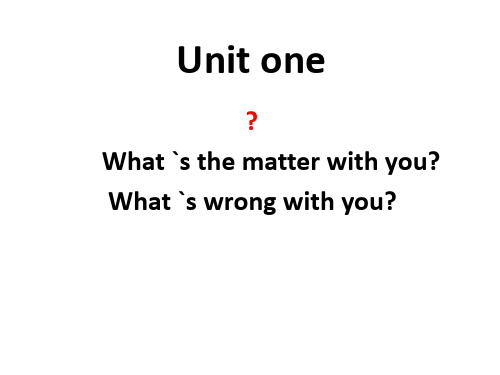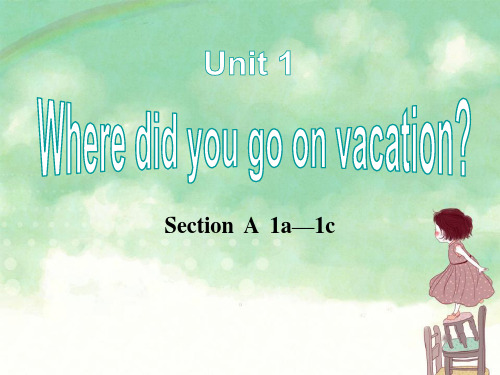Unit 1 Where did you go on vacation(课件 教案练习 反思)46
Unit 1 Where did you go on vacation_课件

2. I have a cold. have a cold意为“伤风, 感冒〞。 表示身体不适的常用词组还有: have a bad cold 患重感冒 have a fever 发烧 have a headache 头痛 have a stomachache 肚子痛, 胃痛 have a toothache 牙痛
1. fever
a lie down and rest
2. stomachache
b drink some hot tea
with honey
3. cough and sore throat c see a dentist and
get an X-ray
4. toothache
d take your temperature
without moving.
Mandy: I think you should lie down and rest. If your head
and neck still hurt tomorrow, then go to a doctor.
Lisa: OK. Thanks, Mandy.
1.What’s the matter? 该句常用于医生和护士询问病人病情时的情景,
fever. What did you do on the weekend? Lisa: I played computer games all weekend. Mandy: That’s probably why. You need to take
breaks away from the computer. Lisa: Yeah, I think I sat in the same way for too long
《Unit1 Where did you go on vacation?》课件PPT

money for food.
had one bowl
It tasted great because she
of rice and
was hungry.
some fish Yes
2d Complete the conversation about Jane’s trip to Penang using the information in the diary entries.
3. The train was late _b_e_ca_u__se__o_f (because
4. Her coat reaches _b_e_lo_w_ (below/ under) her knee.
5. The boy is o_l_d__en__o_u_g_h(enough old/ old enough) to get dressed himself.
umbrella so they were wet and cold. They couldn’t see 9._a_n_y_th_i_n_g_ below because of the bad weather. Jane’s father didn’t bring enough money, so they just had one bowl of rice and some fish. The food tasted great because they were so 10._h_u_n_g_r_y__.
This house isn’t big enough for us .
8. below 意为“在……下面,到……下面”
[辨析] below与under的区别: below指某物处于较低的地方,但不一定 是正下方; under指处于某物的正下方。 e.g. 我们在月下。
Unit 1 Where did you go on vacation? Se课件(共26张PPT)

Did you buy anything special? Yes, I bought something for my father.
How was the food?
Everything tasted really good!
Did everyone have a good time? Oh, yes. Everything was excellent.
过去的时间
谈论过去的事情
动词用过去式
1.一般过去时表示 过去 某个时间或某一段时间内发生 的动作或存在的状态,常和表示 过去 的时间状语连用。
2. 一般过去时也表示___过__去____经常或反复发生的动作, 常和often,always 等表示频度的时间状语连用。
e.g.:He always went to work by bus last year.
21. listen — listened
23004
II. 用所给动词的适当形式填空。
1. We _l_i_v_ed__ (live) in Japan last year. 2. Jack_s_t_o_p_p_e_d_ (stop) the car last Sunday. 3. Tom _c_le_a_n_e_d_ (clean) his room and __st_u_d_ie_d__ (study) for the
Unit 1 Where did you go on vacation?
Section A (Grammar~3c)
23004
能掌握复合不定代词的表意功能以及特殊用法。 能学会运用一般过去时态的各种句式来谈论自己 或别人的假期活动。
23004
Grammar Focus
人教版八年级上册Unit 1 SectionB 课件(共43张ppt)

Words Review
enough adj&adv. 足够的(地);充足的 (地);充分的(地) hungry adj. 饥饿的 as adv. 像……一样;如同 hill n. 小山;山丘 duck n. 鸭 dislike v.&n. 不喜爱(的事物);厌恶 (的事物)
What do you think of paragliding, yellow noodles and Weld Qucy?
yellow noodles, Jane had a good time in Penang too. Now let’s read Weld her Qucy diary to know something about this beautiful place.
paragliding
1. What do people usually do on vacation? ( ) eat delicious food ( ) go to the mountain beach 2a Beforeor you ( ) swim or tried paragliding read ( ) write a diary There’s a survey about other things: ________________________ vacation. Please help me 2. Whatfinish. activities do you find enjoyable? ( ) eat delicious food ( ) go to the mountain or beach ( ) swim or tried paragliding ( ) write a diary other things: ________________________
人教版八年级上册英语Unit1 Where did you go on vacation课件(35张ppt)

•Language structures:
Where did you go on vacation? I went to New York City. Did you go out with anyone? No. No one was here. Everyone was on vacation. Did you buy anything special? No, I bought nothing. How was the food? Everything tasted really good!
Linda: Did you go shopping?
Alice: Of course! I bought ______ for my parents, but _______ for myself.
Linda: Why didn’t you buy _______ for yourself?
Alice: I didn’t really see _______ I like.
Pairworks:
1. How was your vacation?
It was pretty good.
2. What did ...?
I went ...
3. How was ....?
It was fantastic.
4. How were ...?
They were friendly.
在这里可以让学生用他们所会的词语回答.
They
My parents.
Task 1 Talk about your vacation activities.
went to the mountain went to the summer camp
《Where did you go on vacation》PPT课件 (共26张PPT)

1b Tapescript Conversation 2 Girl: Where did you go on vacation, Sally? Sally: Nowhere. I stayed at home. Girl: And where did you go, Brad? Brad: I visited my uncle. Conversation 3 Boy 1: Where did you go on vacation, Tom? Tom: I went to summer camp. It was great.
Revision How was your weekend?
It was great / OK /not bad / not very good … What did you do on the weekend?
do my homework clean my room play tennis visit my aunt have a party practice English play soccer go to the beach go to the movies stay at home do some reading study for the test
Fill in the blanks in the conversation. Use “was” or “were” . Example : It was rainy . The mountains were beautiful . was Amy : How_____your vacation, Lin ? Lin : It _____ was pretty good. Amy : How were _____ the beaches? Lin : Theywere _____ fantastic. Amy : How _____ was the weather? Lin : It was _____ hot and humid. Amy : Howwere _____ the people? Lin : Theywere _____ unfriendly.
Where did you go on vacation Section A 1a-2d课件
Textbook
2d Role-play the conversation. Rick: Hi, Helen. Long time no see. Helen: Hi, Rick. Yes, I was on vacation last month. Rick: Oh, did you go anywhere interesting? Helen: Yes, I went to Guizhou with my family. Rick: Wow! Did you see Huangguoshu Waterfall? Helen: Yes, I did. It was wonderful! We took quite a few photos there. What about
Textbook
1b Listen and number the people in the picture [1–5].
2 4
5 3
Tapescript
Conversation 1
Xiang Hua: Hey, Tina. Where did you go on vacation? Tina: I went to the mountains with my family. Xiang Hua: Did everyone have a good time? Tina: Oh, yes. Everything was excellent.
②Did you do anything interesting, Bob?
Lead-in
—What did you do on vacation? —I did…
New words
anyone /ˈeniwʌn/ pron. 任何人 anywhere /ˈeniweə/, /ˈeniwer/ adv. 在任何地方 wonderful /ˈwʌndə(r)fl/ adj. 精彩的;绝妙的
Unit1 Where did you go on vacation -完整版课件
1. 学习Jane的一次度假经历,能够用一般过去时态描述自 己的旅行经历。 2. 能够使用skimming和scanning阅读技巧找出文章的主要 内容,并完成任务。 3. 培养学生的阅读能力和语言表达能力。
Warming-up Have you ever been to Malaysia?
went to Penang Hill started raining waited for the train got to the top wet and cold
had one bowl of rice and some fish
Post-reading
Try to retell the diaries. Georgetown
yes
Went to Penang
no
Hill
Had rice and fish
yes
They were delicious.
It had a long history.
They were wet and cold because of the rain. It tasted great because she was hungry.
How The weather happy and sunny and hot
excited
enjoyable sunny and hot
Read Jane’s second diary and write “T” or “F”. F 1. They went to the top of Penang Hill on foot. F 2. Only a few of people waited for the train. T 3. The weather was terrible. F 4. Jane’s father brought enough money. F 5. The food tasted boring.
Unit_1_Where_did_you_go_on_vacationPPT课件
clean play visit study have go
cleaned played visited studied had went
stay
stayed
watch
watched
practice practiced
do
did
am / is was
❖ 二.句型转换 ❖ 1.Jack went to France on vacation .(对划线部分提问) ❖ W__h_e_r_e_ __d_id__ Jack_g_o__ on vacation? ❖ 2.I bought nothing.(改为同义句)。 ❖ I __d_i_d_n_’t_b_u_y__a_n_yt_h_in_g___________. ❖ 3.Betty studied for tests last Friday.(改为一般疑问句) ❖ _D_i_d_Betty_s_tu_d_y_for tests last Friday? ❖ 4.They played basketball yesterday.(对划线部分提问) ❖ W__h_a_t __d_id___ they __d_o___ yesterday? ❖ 5. Jane bought something special.(改为否定句)
快快加油 呦!)
去夏令
去海滩3
营3 去爬山
3
Listen and number the people in the picture. (1b)
1. Tina 2. Xiang Hua 3. Sally 4.Bob 5. Tom
2
1
5
4
3
Listen. Where did the people go
部编人教版八年级英语上册《【全册】第1至5单元》精品PPT优质课件
He went to New York City.
Where did he go on vacation?
He went to the beach.
Language points
1. — Where did you go on vacation? — I went to the mountains.
Xiang Hua: _I_w__en__t _to__N_e_w__Y_o_r_k__C_i_t_y_.
Conversation 2
Girl: What did you do on vacation, Sally? Sally: Nothing. I just _s_t_a_y_e_d_a_t__h_o_m_e__. Girl: And did you do anything interesting, Bob? Bob: Yes. I _v_i_si_t_ed__m__y_u_n_c_l_e_. We went fishing,
Xiang Hua: Hey, Tina. Where did you _g_o_o_n__v_a_c_a_ti_o_n_? Tina: I _w_e_n_t__to__th__e_m__o_u_n_ta_i_n_s_ with my family.
Xiang Hua: Did everyone have a good time? Tina: Oh, yes. Everything was excellent. Where did you go, Xiang Hua?
拜访我的叔叔 照相 上个月 黄果树瀑布 去度假
Lead-in
What did you do on summer vacation?
visited museums
- 1、下载文档前请自行甄别文档内容的完整性,平台不提供额外的编辑、内容补充、找答案等附加服务。
- 2、"仅部分预览"的文档,不可在线预览部分如存在完整性等问题,可反馈申请退款(可完整预览的文档不适用该条件!)。
- 3、如文档侵犯您的权益,请联系客服反馈,我们会尽快为您处理(人工客服工作时间:9:00-18:30)。
最大最全最精的教育资源网
全国中小学教育资源门户网站 | 天量课件、教案、试卷、学案 免费下载 | 效果分析
本节课学习了Unit 1 Where did you go on vacation? Period 1.在设计上思路比较清晰,由浅入深,教师引领学生一步步,渐渐进入每个任务,让学生非常自然的领会本课的知识点。
具体来说,好的方面有几下几点:
(一)创设情境,运用语言。
1、将单词教学与句型相结合,加深学生的理解与掌握。
2、注重语感教学。
加强听说训练,努力做到视、听、说同步,培养英语学习兴趣。
3、对话使用,角色表演。
在教学过程中,注意经常创造一个心情舒畅、充满情趣的语言环境,使学生置身于这种富于想象的情景之中,各自扮演一定的角色,进行会话表演,他们从表演中提高了实际应用英语的能力,达到对所学知识举一反三、融会贯通、巩固提高的目的。
(二)注重基础,内容适当
一方面突出知识重点,一方面要注重基础,一方面面向全体学生,注意课堂安排,平时注意了解和分析每个学生的具体实际情况,课堂上,让每个学生都参与学习活动,设置不同的情景,在情景中进行教学,学生们不知不觉地学习了知识,使教学走向希望。
(三)温故知新,回忆所学
可课前在课堂上复习旧知识,复习一般过去时态,让学生反复操练,由易而顺利地完成一个个学习目标,以旧带新。
具体方法是:学习—复习—再复习。
复习时做到系统性、针对性、综合性。
用以前学过的词语操练新句型或已学过的句式学习新单词。
及时对于重点内容进行练习,加深学生的印象。
(四)多样化教学方法,培养学生对说英语的兴趣。
在整个教学过程中,采用了创设情境、组织活动、小组互动等方法,强调学生在交际中,理解运用本课的语言功能项目。
并利用电教手段,激发学生的兴趣:
按照现行的新课程标准,倡导以人为本,以学生为课堂主体,回顾本节课,存在很多问题:
1.首先是单词学习与复习,本来我想结合图片学习新单词,但是,单词已经学习过了,在了解这一情况以后,我完全可以把它作为单词的复习出现,可以让学生拼读单词,而不是直接给出。
如果这样,可以更清楚的检查学生对这部分单词的掌握情况。
2.课前没有检查多媒体设备,课件有时显示不出来,影响了效果,浪费了时间。
3.对于活动的参与,一是基础差的学生参与不够广,二是因为班级的人数比较多,回答问题的总是哪些频繁举手的学生,而有些学生可能一次也没有回答过问题,没有做到全员参与活动。
